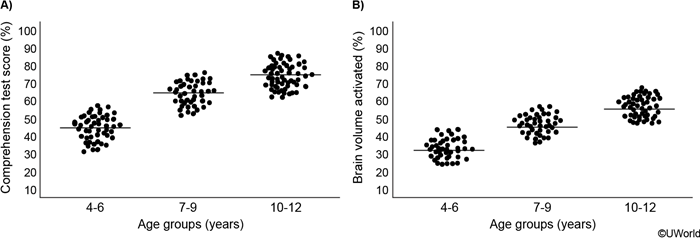Passage
Language is a skill acquired during early childhood that continues to develop for many years. Communication using language involves multiple complex processes, including listening, speaking, comprehension, and cognition. Receptive language ("language input") involves language comprehension, while expressive language ("language output") involves the ability to produce intelligible language. In normally developing children, receptive language emerges first, followed by expressive language.To examine how age plays a role in the activation of the neurological networks involved in processing more complex language, researchers used functional magnetic resonance imaging (fMRI) to analyze how the use of receptive language generates metabolic activity in the brains of children. A total of 672 participants were divided into three groups by age: Age 4-6 (n = 219) , age 7-9 (n = 224) , and age 10-12 (n = 229) .Participants in each group were asked to listen to pre-recorded stories while undergoing fMRI of the brain to determine if an age-related difference could be found in activated brain tissue volume during the listening task. The recorded fMRI-monitored listening portion of the experiment lasted approximately 5 minutes. Immediately following this listening exercise, fMRI monitoring was discontinued and the children were administered tests to determine comprehension of the material. None of the children had been informed that they would be taking a comprehension test prior to its actual administration.
 Figure 1 fMRI listening task analyzed per age group: (A) comprehension test scores, and (B) brain volume activated (Note: Solid lines represent the mean in each group.)
Figure 1 fMRI listening task analyzed per age group: (A) comprehension test scores, and (B) brain volume activated (Note: Solid lines represent the mean in each group.)
M. M. Berl, E. S. Duke, J. Mayo, L. R. Rosenberger, E. N. Moore, J. VanMeter, N. Bernstein Ratner, C. J. Vaidya, and W. D. Gaillard ©2010 by Elsevier, Inc.
-Which of the following explanations for the results shown in Figure 1A most aligns with the learning theory of language development?
A) The children developed their language skills through exposure to the environment, operant conditioning, and imitation and repetition of language.
B) The children who scored well on comprehension tests have learned that achievement is rewarded, motivating them to think more actively during the listening exercise.
C) Older children's performances on the comprehension task were driven by both biological factors and exposure to social situations.
D) Older children were able to learn the reading material more effectively because they had already passed the critical period of language development.
Correct Answer:
Verified
Q31: Passage
Of the biological factors impacting color perception
Q32: Passage
Language is a skill acquired during early
Q33: Passage
Lucid dreaming occurs when a person becomes
Q34: Passage
Of the biological factors impacting color perception
Q35: Passage
Lucid dreaming occurs when a person becomes
Q37: Passage
Numerous studies suggest that physicians make both
Q38: Passage
Of the biological factors impacting color perception
Q39: Passage
Numerous studies suggest that physicians make both
Q40: Passage
Of the biological factors impacting color perception
Q41: Passage
Before memories have been consolidated they are
Unlock this Answer For Free Now!
View this answer and more for free by performing one of the following actions

Scan the QR code to install the App and get 2 free unlocks

Unlock quizzes for free by uploading documents